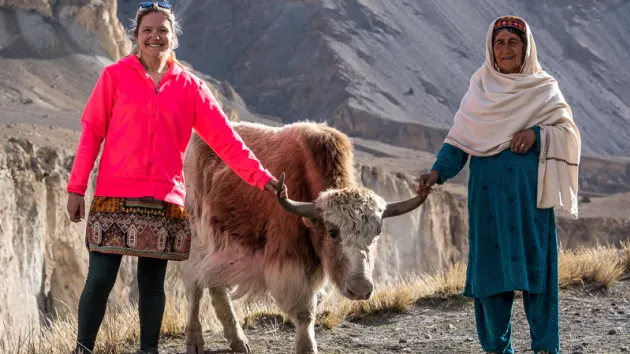
Posted on 02/17/2024 2:50:49 PM PST by Red Badger

A Wakhi woman and her yak in Avgarch Village, one of the oldest settlements of Hunza Valley that’s only accessible by foot. Photo: Samantha Shea
~~~~~~~~~~~~~~~~~~~~~~~~~~~~~~~~~~~~~~~~~~~~~~~~~~~~~~~~~~
In a little-known mountainous area called Hunza Valley, located far north of Pakistan, people seem to defy all medical odds.
It is primarily home to the Burusho and Wakhi people, who for centuries have survived and thrived in remote villages — with minimal amenities and rudimentary health facilities. Studies have found that the average life expectancy here is around 100 years.
My husband was born and raised here, and is from the Burusho indigenous community. After we got married, I left the U.S. and we settled down in the Central part of the valley.
Here are some intriguing habits that help the people of Hunza live longer:
1. They consume apricot seeds and oil
Apricot trees are one of the most important local crops in the valley. Studies have shown that apricot seeds can help fight cancer and other sources of inflammation in the body, in part due to a compound called amygdalin.
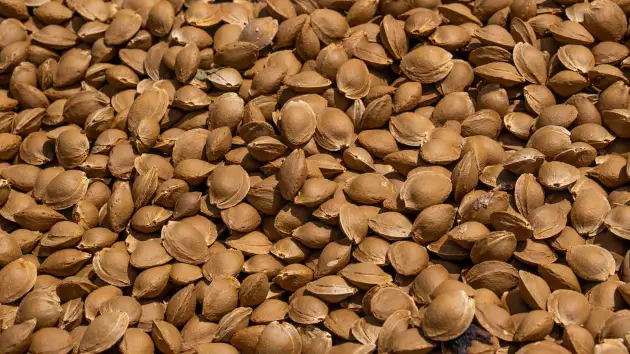
Most people in Hunza have at least one apricot tree, and the seeds are harvested from inside the apricots every summer. Photo: Samantha Shea
Nearly every traditional Hunzai dish includes apricot oil. Back in the day, it was made by hand, but now locals use machines to extract it from their harvested kernels.
My mother-in-law told me that 50 years ago, it was all anyone used to cook food with, even meat. Dried versions of the fruit also help with altitude sickness, and are boiled into a soup come winter.
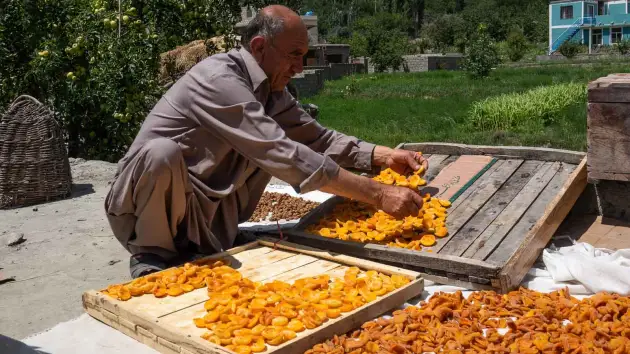
My father-in-law organizing dried apricots on his roof Photo: Samantha Shea
2. They never stop moving
People here are healthy and active throughout their lives, well into old age. It’s very common to see folks in their 80s outside, even in the winter. Elderly family members still graze their cows and sheep, collect wood, and do other household tasks.
They also participate in community activities like “rajaki,” which involves cleaning out the elevated water canals when spring arrives.
Locals of all ages cycle, skate, and play sports like soccer and cricket every day.
3. They drink glacier water
Hunza is filled with dozens of glaciers, all of which melt throughout the summer.
A shiny, dark-grey liquid, “Hunza water” has long held the interest of scientists. Unlike other water sources, this glacial water is naturally filtered by layers of ice and rock and contains precious minerals.
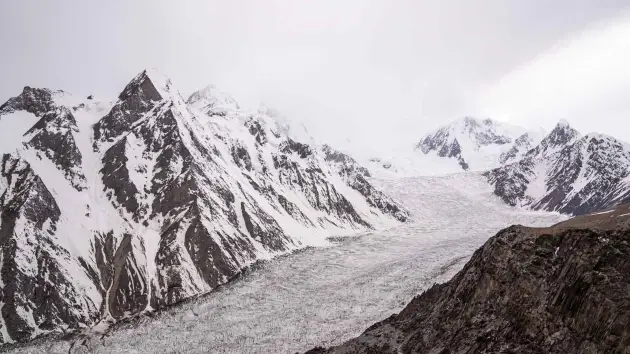
A view of the Passu Glacier from Patundas, a meadow in Upper Hunza where locals bring their livestock to every summer. Photo: Samantha Shea
Some argue that the water contains quartz (sillica) minerals in colloid form, which are considered to be powerful antioxidants.
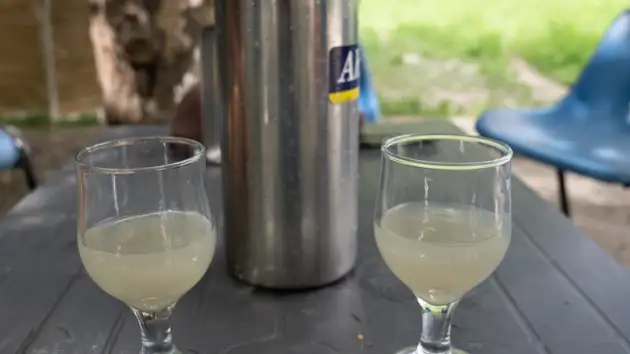
What Hunza glacier water looks like straight from the source. Photo: Samantha Shea
The runoff generally lasts from May to October each year, which is when you’ll find it served at restaurants and in homes. Locals swear by it, and prefer it to filtered water.
4. They rarely eat processed foods Almost every piece of meat eaten in Hunza comes from a locally sourced animal that’s been recently killed.
People rarely eat processed foods, and you certainly won’t find any fast food spots here. Meals are typically prepared fresh in the home daily, and almost every household grows some kind of vegetable.
Spinach is especially popular, and other favorites like tomatoes and potatoes are grown locally and organically.
5. They have strong community values
Neighborhoods and villages are tight-knit, and the people of Hunza take care of each other, especially the older members of the community.
Retirement homes don’t exist here. Elders are highly respected and attended to by their families.
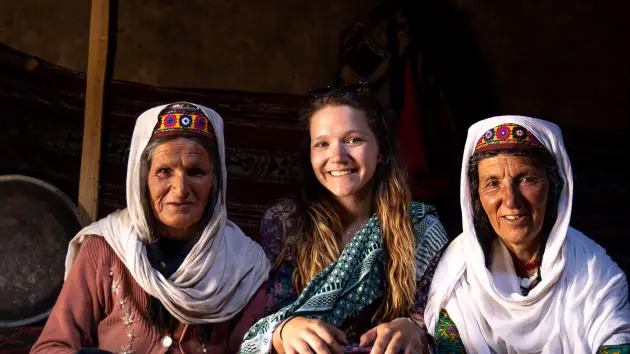
Myself and two strong older women from Chapursan Valley, which is one of the most remote parts of Hunza situated alongside the Wakhan Corridor. Photo: Samantha Shea
With essentially zero crime, it’s safe enough for kids to wander about on their own, even at young ages. It’s likely one of the last places where you’ll see more outdoor play than iPad play.
Having lived here for for the past two years, I can happily say that I’ve never had the privilege of experiencing a society as collective as this one.
~~~~~~~~~~~~~~~~~~~~~~~~~~~~~~~~~~~~~~~~~~~~~~~~~~~~~~~~~~~~
Samantha Shea is a Polish-American travel writer from Connecticut. She lives and works remotely in Hunza Valley, Pakistan, and runs women’s tours to the region. Follow her on Instagram and YouTube.
Ping!.................
My grandmother—who I write about often...
lived a life in excellent health—until she died at age 106.
She smoked one cigarette every night after dinner.
She loved giving the “experts” the middle finger.
Needless to say she outlived all her doctors who told her to stop smoking.
Lol.
Great article, Red. Thanks for posting it.
Before the advent of mechanized agriculture, gasoline-driven tractors, and fast food, what she describes is how Americans lived. Lots of hard work and outdoors all your life, strong community values, no fast food. But Americans didn’t approach anywhere near 100 life span.
I’ll bet you it’s the Yak Milk!
I wonder if there’s anything to the colloidal quartz theory. That’s a new one. At least colloidal quartz doesn’t turn you blue like colloidal silver.
I bought some of the wine for the Blue Zone longevity. I am not a wine drinker but thought I would give it a try. Had to drive to a big liquor store to find one from Sardinia.
Limiting processed foods has to be a good thing. I did one strict diet to determine what was causing me problems..Whole 30 diet.....and it was hard to find stuff that I could eat.
Did lose weight. Did feel a lot better. Inflammation was reduced. Did see the things that made me feel worse. But back to all the old bad stuff. I need to retry it again in a modified way./
As far as I know, quartz is mostly inert.............
More on my grandmother’s secret.
She never worked a day in her life.
Her parents took care of her financial needs and then my grandfather married her young and took care of her financial needs.
Her “trick” was she mastered the art of being grateful for what she had.
She knew she was fortunate—never forgot it.
“I had a doctor..........but he died.” - George Burns, age 99
i dont think I would want to give birth at 60
https://lyma.life/journal/how-to-increase-longevity-hunza-tribe-secrets/
Stress mitigation is important. Not working would certainly help with stress.
Modern America has truly strayed from the traditional way.
One cigarette isn’t SMOKING.
1 or 2 or 3 ppd is SMOKING.
thanx red
heads up LJ
Her positive attitude was amazing.
She had so many traits that are very difficult for most folks to emulate:
—No agenda. She had nothing to prove to anybody.
—Not really materialistic. She lived well and had nice things but those things didn’t own her, were not that important to her and she never bragged about it or held it against people who were less fortunate.
—A true independent thinker—never believed anything the “experts” said about anything. She did her own research and took her time drawing conclusions.
—Truly pleasant to be around—lightened up anyone’s day.
She had a way of being comfortable in her own skin that very few people could match.
It is a skill they don’t teach you anywhere—you have to learn it yourself.
The Wakhan Corridor of Afghanistan: One of the most isolated spots on earth.
Tell that to the Karens—one puff of second-hand smoke and they act like somebody just dropped a nuclear bomb on them.
Here is one hilarious story that showed how she was...
She was in her mid nineties and refused to move to an assisted living facility. My grandfather had died and she lived by herself in a large house—though a maid did come and clean now and then.
My parents decided it was time to make the “hard sell”.
My father talked her into taking a tour of the nearby upscale assisted living facility. He drove her there and when they arrived the tour began.
She smiled at everybody, looked them in the eye, shook their hand, told them how much she appreciated their help.
This went on for an hour or so.
My father is thinking that this is going well.
They leave the building and he says “so are you ready to sign the papers and move in with these nice folks”.
Grandma smiled sweetly and said softly (so none of the facility staff could hear):
“Over my dead body.”
Sounds like my Mom. When she was 97 my oldest brother took her to the assisted living facility for the tour. When it was done she turned to my brother and said “I came, I saw, now take me back home”. She lived in her house until her last month when she died at 102.
Yeah—that is one of the keys to living to a ripe old age.
You have to have strong personal identity and integrity—and refused to get pushed around by anybody.
This nonsense again? I remember it from 50 years ago when over 100 age elderly were found from Peru to Russian Caucasus to Nepal.
Then it was found many of the men had lied about their age when there was a possibility of a military draft, claiming to be born earlier than they actually were.
Interesting, thanks!
Disclaimer: Opinions posted on Free Republic are those of the individual posters and do not necessarily represent the opinion of Free Republic or its management. All materials posted herein are protected by copyright law and the exemption for fair use of copyrighted works.